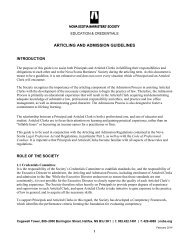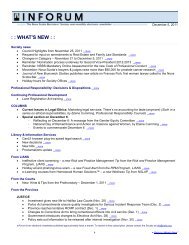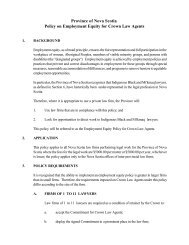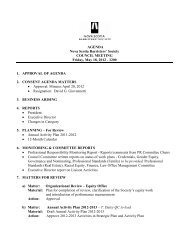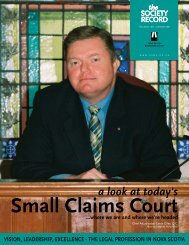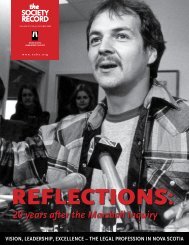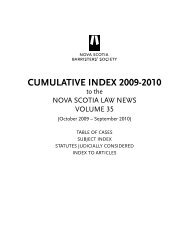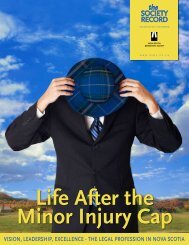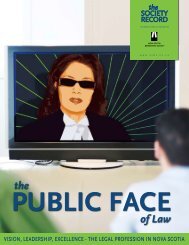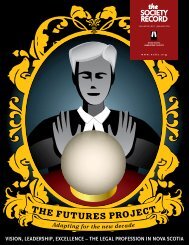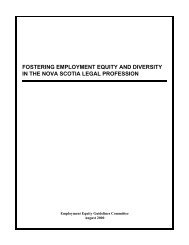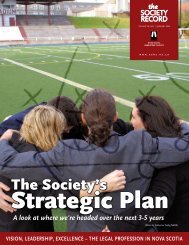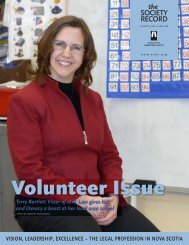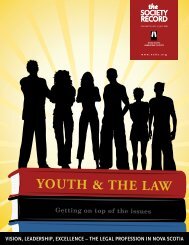the SOCIETY RECORD - Nova Scotia Barristers' Society
the SOCIETY RECORD - Nova Scotia Barristers' Society
the SOCIETY RECORD - Nova Scotia Barristers' Society
You also want an ePaper? Increase the reach of your titles
YUMPU automatically turns print PDFs into web optimized ePapers that Google loves.
Photo by Nick Pearce/Dalhousie University<br />
Ethics in context<br />
22nd F.B. Wickwire Memorial Lecture<br />
Ethics are elusive. Ethics are evolving. The one thing ethics<br />
are not: easy. That was <strong>the</strong> message six legal experts delivered<br />
to a packed audience at <strong>the</strong> annual F.B. Wickwire Memorial<br />
Lecture in Professional Responsibility and Legal Ethics.<br />
Each panelist tackled a different – and contemporary – ethical<br />
issue. The first speaker Philip Girard, professor of law, history and<br />
Canadian studies at <strong>the</strong> Schulich School of Law, looked at ethics and<br />
<strong>the</strong> profession today by looking back at <strong>the</strong> two traditions that have<br />
shaped legal ethics in Canada – British and American.<br />
Although <strong>the</strong> British had a code of etiquette, it was never formally<br />
taught, said Mr. Girard. “It was simply absorbed. There was only one<br />
rule: what would a gentleman do?”<br />
In <strong>the</strong> U.S., on <strong>the</strong> o<strong>the</strong>r hand, where a much more individualistic<br />
legal society existed, <strong>the</strong> profession began to enshrine in writing what<br />
constituted ethical behaviour.<br />
Canada took a hybrid approach, said Mr. Girard. The first code was<br />
developed by <strong>the</strong> Canadian Bar Association in 1920, but it would be<br />
ano<strong>the</strong>r 50 years before discussions over what constitutes good ethics<br />
began in earnest.<br />
The issue is an important one – and still<br />
frequently debated. Sarah Bradley, an<br />
associate professor of law at Dalhousie,<br />
pointed out in her presentation that<br />
donalee Moulton<br />
Freelancer<br />
while corporate frauds of recent years have grabbed headlines,<br />
lawyers’ associations with <strong>the</strong>se scandals have gone relatively scot free.<br />
“The reality is most of <strong>the</strong>se crimes could not be carried out without<br />
professional facilitators, particularly <strong>the</strong> accountants and <strong>the</strong> lawyers.<br />
Yet we rarely see <strong>the</strong>se people held to account,” she said.<br />
When <strong>the</strong> net is cast wider, and professionals are drawn into <strong>the</strong> fray,<br />
it is usually accountants who are more likely to go down with <strong>the</strong><br />
corporation. In <strong>the</strong> Enron scandal, for example, <strong>the</strong> accounting firm<br />
of Arthur Andersen was destroyed, but <strong>the</strong> main law firm associated<br />
with <strong>the</strong> company emerged virtually unsca<strong>the</strong>d, Ms. Bradley noted.<br />
Lawyers justify <strong>the</strong>ir behavior in <strong>the</strong>se situations, she added. “We use<br />
<strong>the</strong> excuse ‘it depends’.”<br />
There are undoubtedly grey areas. Geoffrey Loomer, an assistant<br />
professor at Schulich, discussed <strong>the</strong> ethical dividing line between<br />
tax evasion and tax avoidance. “It’s obvious counselling tax evasion<br />
is bad news, but tax avoidance is more difficult,” he noted. “Some<br />
20<br />
The <strong>Society</strong> Record



